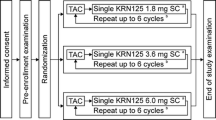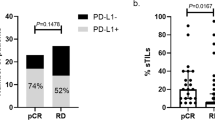Abstract
A 45-year-old woman underwent a modified radical mastectomy for right breast cancer in July 1996. As lymph node metastases were quite advanced, chemotherapy was started with anthracyclines. Four years after surgery, cough and dyspnea appeared. Chest radiograph and CT showed reticular shadows bilaterally and slight pleural effusion, suggesting lymphangitic lung metastasis of breast cancer. Biweekly intravenous docetaxel (TXT, 45 mg/m2) was initiated. Four courses of TXT ameliorated her complaints and radiographic findings. A total of 30 continuous courses of TXT suppressed disease exacerbation for 18 months until new lesions manifested in January 2002. The main side effects were grade 2 leukopenia and alopecia. This case report describes a patient with long-term suppression of lymphangitic lung metastasis of breast cancer using biweekly TXT without severe side effects or worsening quality of life.
Similar content being viewed by others
References
Bruce DM, Heys SD, Eremin O: Lymphangitis carcinomatosa: A literature review.J R Coll Surg Edinb 41:7–13, 1996.
Sadoff L, Grossman J, Weiner H: Lymphangitic pulmonary metastasis secondary to breast cancer with normal chest x-rays and abnormal perfusion lung scans.Oncology 31:164–171, 1975.
Adachi I: Clinical studies on the treatment of the advanced breast cancer with lung metastasis.Gan To Kagaku Ryoho 9:972–978, 1982 (in Japanese with English abstract).
Valero V, Holmes FA, Walters RS: Phase II trial of docetaxel: A new highly effective antineoplastic agent in the management of patients with anthracycline-resistant metastatic breast cancer.J Clin Oncol 13:2886–2894, 1995.
Salminen E, Bergman M, Huhtala S, Jekunen A, Ekholm E: Docetaxel, a promising novel chemotherapeutic agent in advanced breast cancer.Anticancer Res 20:3663–3668, 2000.
Dieras V, Chevallier B, Kerbrat P, Krakowski I, Roche H, Misset JL, Lentz MA, Azli N, Murawsky M, Riva A, Pouillart P, Fumoleau P: A multicentre phase II study of docetaxel 75 mg/m2 as first line chemotherapy for patients with advanced breast cancer: Report of the Clinical Screening Group of the EORTC.Br J Cancer 74:650–656, 1996.
Kreisman H, Wolkove N, Finkelstein HS, Cohen C, Margolese R, Frank H: Breast cancer and thoracic metastasis: Review of 119 patients.Thorax 38:175–179, 1983.
Munk PL, Muller NL, Miller RR, Ostrow DN: Pulmonary lymphangitic carcinomatosis: CT and pathologic findings.Radiology 166:705–709, 1988.
Stein MG, Mayo J, Muller N, Aberle DR, Webb WR, Gamsu G: Pulmonary lymphangitc spread of carcinoma: Appearance on CT scans.Radiology 162:371–375, 1987.
Schimmel DH, Julien PJ, Gamsu G: Resolution of pulmonary carcinoma of the breast.Chest 69:106–108, 1976.
Hamilton CR, Plowman PN: Prolonged remission of lymphangitis carcinomatosis from breast cancer.Br J Dis Chest 81:400–403, 1987.
Verweij J, Clavel M, Chevalier B: Paclitaxel (Taxol) and docetaxel (Taxotere): Not simply two of a kind.Ann Oncol 5:495–505, 1994.
Burstein H, Manola J, Younger J, Parker LM, Bunnell CA, Scheib R, Matulonis UA, Garber JE, Clarke KD, Shulman LN, Winer EP: Docetaxel administered on a weekly basis for metastatic breast cancer.J Clin Oncol 18:1212–1219, 2000.
Aihara T, Kim Y, Takatusuka Y: Phase II study of weekly docetaxel in patients with metastatic breast cancer.Ann Oncol 13:286–292, 2002.
Shin E, Ishitobi M, Hiraoka M, Fujitani K, Mishima H, Nishisho I, Sawamura T, Hasuike Y, Tsujinaka T: Phase I study of docetaxel administration by biweekly infusion to patients with metastatic breast cancer.Anticancer Res 20:4721–4726, 2000
Kuroi K, Bando H, Saji S, Toi M: Weekly schedule of docetaxel in breast cancer: Evaluation of response and toxicity.Breast Cancer 10:10–14, 2003.
Adachi I, Watanabe T, Takashima S, Narabayahsi M, Horikoshi N, Aoyama H, Taguchi T: A late phase II study of PR56976 (docetaxel) in patients with advanced or recurrent breast cancer.Br J Cancer 73:210–216, 1996.
Ninomiya J, Horiguchi J, Koibuchi Y, Yokoe T, lino Y, Morishita Y: Phase I study of biweekly docetaxel in patients with metastatic breast cancer.Proc Jpn Breast Cancer Soc 2002, A-053 (in Japanese).
Rubens RD: Management of advanced breast cancer.Int J Clin Pract 55:676–679, 2001.
Author information
Authors and Affiliations
Corresponding author
About this article
Cite this article
Ninomiya, J., Horiguchi, J., Koibuchi, Y. et al. Long-term suppression of lymphangitic lung metastasis from breast cancer using biweekly docetaxel: A case report. Breast Cancer 10, 361–365 (2003). https://doi.org/10.1007/BF02967658
Received:
Accepted:
Issue Date:
DOI: https://doi.org/10.1007/BF02967658




